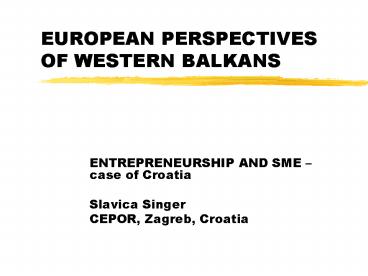EUROPEAN PERSPECTIVES OF WESTERN BALKANS PowerPoint PPT Presentation
Title: EUROPEAN PERSPECTIVES OF WESTERN BALKANS
1
EUROPEAN PERSPECTIVES OF WESTERN BALKANS
- ENTREPRENEURSHIP AND SME case of Croatia
- Slavica Singer
- CEPOR, Zagreb, Croatia
2
Basic question and answer
- Q How to survive in a globalized world?
- A To develop an enterprising society of
- Empowered individuals
- Ethical businesses
- Fair government
- Active civil society,
- able to compete and cooperate.
3
Need for change...
- In looking at problems
- Connected, not isolated
- In seeking solutions
- Entrepreneurial (holistic, opportunity driven)
- In policy approach
- from traditional macroeconomic view to growth
theory of firm - In definition of stakeholders
- Individuals, firms, government, civil society
4
How to find best answers?
- To know own situation
- To know what is going on around you
- To know what you want to achieve
5
Croatia now... 1
- unemployment, high and persistent
- 16 ILO - 1991-2003
- symetric change in structure of employment
1990-2000 - Doubled in small enterprises
- Halved in large enterprises
- regional development imbalances
- 1 to 6, in GDP/capita, TEA index
6
Croatia now... 2
- low competitiveness
- low entrepreneurial activity
- low profitability of SMEs
- high corruption
7
Competitiveness 1
- Growth Competitiveness Index
- Croatia
- from 53.(2003) to 61.(2004)
- Bulgaria
- from 64. (2003) to 59.(2004)
- economic growth in long run
- technology
- public institutions
- macroeconomic environment
8
Competitiveness 2
- Microeconomic Competitiveness Index
- Croatia
- from 62. (2003) to 67. (2004)
- Bulgaria
- from 77. (2003) to 70. (2004)
- sustainable level of productivity
- company operations and strategy
- quality of the national business environment
9
indices
TEA total entrepreneurial activity
(start-up) opportunity vs. necessity FEA
firm entrepreneurial activity (growth
potential) more than 20 employed after 5
years, new products, new technology
10
Croatia vs World (1)
2002-2003 avg 41 countries Entrepreneurial
activity (TEA) World 9.9 vs. Croatia
3.10 (41.) Slovenia 4.30 (35.) Growing
businesses (FEA) World 2.0 vs. Croatia
1.12 (36.) Slovenia 2.70 (7.)
11
Croatia vs World (2)
of employment in growing businesses World 1
2.3 vs. Croatia 4.5 (39.)
Slovenia 17.1 (7.)
12
Why the interest in growth firms?
- employment creation
- targeting on winners' and quality
- the middle business structure argument
- better returns to investment - long term
- better returns to public efforts
- growth sector development concern
- high tech development concern
- developing export potential
13
Values
- Self-employment desirable career?
- 58 yes
- Entrepreneurs have high social status?
- 48 no, 28 yes, 24 do not know
- Media present success stories?
- 48 no, 40 yes
14
Entrepreneurs are born, not made?
- No, education matters.
- Those with more education are more likely to
pursue opportunity entrepreneurship more
benefits for national growth - 11.96 TEA (with knowledge and skills)
- vs.
- 0.21 TEA (without knowledge and skills)
15
Uneven distribution of optimism...
- Zagreb Slavonia
- Entrepreneurial intentions? 9.6
2.5 - Business opportunity? 20.4
10.3 - Have knowledge? 41.5
16.9 - Entrepreneur
- good career? 60.3 43.8
16
What is going on in EU...
- Entrepreneurship in Europe, green paper, 2003
- Charter for Small Enterprises, 2000 Croatia
signed in 2003
17
What Croatia wants to achieve?
- Goals (2004-2014 time horizon)
- Sustainable growth of GDP (55-60 of EU GDP) 5
annual growth of GDP - Lowered unemployment 8
- Increased social inclusiveness
- National Council on Competitiveness
- 2004.
18
Many surveys agree on obstacles...
- Education
- Administrative barriers
- Government policies/programs
- Cultural and social norms
19
But small businesses ask for...
- Taxation policy
- Technological capacity
- Better legislation
- Better representation
20
Government is focusing on...
- Developing institutional infrastructure for
enhancing entrepreneurship - Clusters, centers for entrepreneurship, business
incubators, business zones... - Subsidized loan programs
- Training services for start-up entrepreneurs
21
But not enough on... 1
- Elimination of administrative barriers
- No silent approval
- Time to register property 956 days, EU15 48,
Bulgaria 19 - Time to start a business 49 days, EU15 31,
Bulgaria 32 - Costs to go through insolvency 26.1 of estate
(recovery rate), EU15 70.2, Bulgaria 34.2
22
But not enough on... 2
- Education
- Upgrading policy capacity in government
- Suffocating in operational programs
- Businesses with growth potential
- Development of non-traditional financial
instruments - Equity, business angels...
23
Concluding questions
- Who are listening to whom?
- Do stakeholders have capacity to communicate?
- Do stakeholders have entrepreneurial capacity for
change?
24
Recommendations
- To work on developing capacity for
- Listening
- Communicating
- Changing
- among all stakeholders (individuals, firms,
government, civil society) in order to develop
consensus on URGENT NEED FOR CHANGE - To identify common international perspective on
progress in entrepreneurship and SME - Global Entrepreneurship Monitor project?
25
CEPOR - SME Policy Center
- Centar za politiku razvoja malih poduzeca CEPOR
- Contact details
- Trg J.F. Kennedy 7/I
- HR-10000 Zagreb, Croatia
- Phone 385 1 2305 363
- Fax 385 1 2345 577
- www.cepor.hr
- E-mail cepor_at_zg.htnet.hr
26
CEPOR founders
- Croatian Chamber of Commerce
- Croatian Chamber of Crafts
- Institute for International Relations, Zagreb
- Economic Institute, Zagreb
- J.J. Strossmayer University in Osijek, Faculty of
Economics, Osijek - Istrian Regional Agency, Pula
- Center for Entrepreneurship, Osijek
- Medjimurje Entrepreneurship Center, Cakovec
- Open Society Institute-Croatia
- Association of Croatian Institutions for
Promoting Entrepreneurship
27
Contact details
Slavica Singer Director CEPOR SME Policy
Center e-mail singer_at_efos.hr

